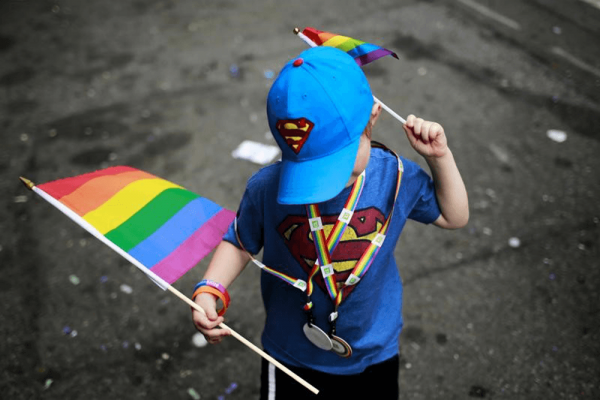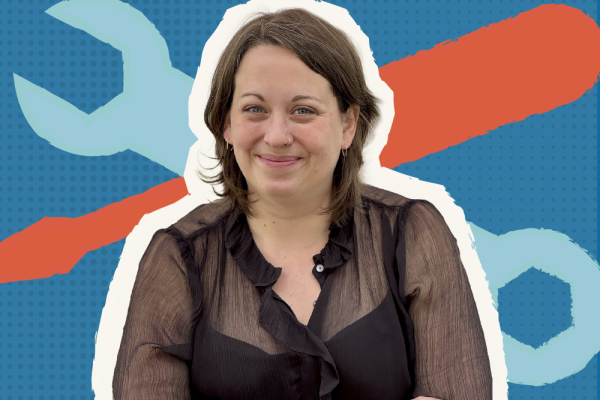For years, Dietz Osborne and his colleagues at Miriam’s Promise adoption agency in Nashville, Tenn. had quietly worked with LGBTQ+ couples looking to adopt children. It was not something the United Methodist-affiliated agency advertised or promoted, but when a same-gender couple came to them, Miriam’s Promise unassumingly welcomed them as clients.
Then, in January 2020, the Tennessee legislature passed a law allowing foster and adoption agencies to cite religious conviction as a reason to refuse to place children with LGBTQ+ families. Osborne is the president and CEO of Miriam’s Promise, a member of the LGBTQ+ community, and father himself. He felt it was time for the small agency to do more.
“I went to the board and said, ‘Now is the time,’” Osborne said, recalling his push for Miriam’s Promise to become publicly and proactively inclusive of LGBTQ+ families, effectively taking a stand against the discriminatory bill. Knowing that the six-person staff felt similarly, he told the board, “If we don’t, you might be looking for a whole new staff.”
The board agreed, and things started changing immediately, Osborne said. No one protested or harassed Miriam’s Promise, but donors did leave. The donors didn’t cite the vocal inclusion of LGBTQ+ families as their reason for leaving, but, Osborne said, the timing spoke for itself. The organization has yet to see donations from churches, individuals, and other organizations return to pre-2020 levels, according to publicly available budget documents, though the reason for the dip in donations could relate to a number of factors, including the COVID-19 pandemic.
Still, some new donors have found Miriam’s Promise, since it made its stance public. So have prospective clients. “More and more same-gender couples are looking to build their families.”
It’s difficult to confirm how many LGBTQ+ families are looking to adopt children, but the U.S. Census Bureau reported in 2020 that same-sex couples were more likely (3.1 percent) than heterosexual couples (1.1 percent) to adopt a child. Around one-fifth of same-sex couples with children had adopted children, while only 2.9 percent of heterosexual couples with children have adopted children. Same-sex couples were also more likely to foster. With more than 1,800 children awaiting adoption in Tennessee’s foster system that year, Osborne knew that the move to exclude LGBTQ+ parents was not just discriminatory, it was bad for the kids.
Training for inclusive adoption and foster care
The entire Miriam’s Promise staff underwent training with All Children - All Families, a nonprofit subsidiary of the Human Rights Campaign.
“We did a lot of work around DEI and anti-racism at the same time,” Osborne said. The goal wasn’t just to be more attractive to LGBTQ+ clients, he said, but to make sure that all their practices were welcoming, and not alienating or harming any families or children. Race and religion are critical components of the adoption process, and the laws that allow agencies to discriminate based on religious conviction don’t only affect LGBTQ+ families.
In 2021, Holston United Methodist Home for Children, in Tennessee, refused to place children with a Jewish family, prompting a lawsuit that is still in court. Miriam’s Promise began as a branch of Holston, covering the Nashville area and central Tennessee, but became independent in 2004, Osborne said. The agency is still affiliated with the United Methodist Church, but not governed by it.
Rev. Brandon Berg is pastor of Norris and Sinking Springs United Methodist Churches in Eastern Tennessee, in the UMC conference with close ties to Holston. When the Jewish family’s case became public around the same time that LGBTQ+ adoption was also being curtailed, Berg’s congregation felt they needed to voice their concern. They did so by pulling their financial support of Holston.
“I couldn’t support an organization that so profoundly limited the possibility of a child growing up in a loving home,” Berg told Sojourners, reflecting on the church’s decision in 2022. He thinks of the biblical story of Moses, whose mother, finding herself in an “untenable situation,” sent her baby to be raised in a household of a different faith — Pharaoh’s. Moses’s foundation in Pharaoh's house was part of his liberating story, Berg pointed out. The baby was cared for, healthy, and reached adulthood — which is what Berg sees as the whole point of adoption. The faith of the home where children grow up, whether it is Christianity or another faith, is part of their story, guided by God.
The All Children - All Families training gets into the fine print of policies and even administrative language to help agencies become more inclusive, explained Phii Regis, the program’s director. The nonprofit makes sure agencies have explicit non-discrimination policies in place and that all application forms, literature, and recruitment material use inclusive language, never defaulting to assume the adoptive parents identify as gendered “mother” and “father.” All Children - All Families provides training for all levels of agency staff as well, helping administrators, counselors, and staff who conduct home study and screenings understand how their day-to-day tasks might offer up chances to be more inclusive.
Some agencies, especially those in states that have laws that allow for anti-LGBTQ+ discrimination, have the opportunity to take that training further, especially in the interest of LGBTQ+ children being placed in any family. Where a state does not mandate protections, the agencies will need to put extra thought into their training for parents. What surprised them most at Miriam’s Promise, Osborne said, was realizing that they would need to create an agency-specific contract, requiring the parents to agree that they would not submit the children to conversion therapy, which is legal in Tennessee.
State legislators aiming to protect discrimination
In fact, in April the state passed a new law, Senate Bill 1738, explicitly allowing LGBTQ+ children to be placed in homes with non-affirming adults. The bill was sponsored by Sen. Paul Rose, the same Tennessee state senator who sponsored the 2020 bill. In both instances, Rose insisted that the point of the bill was to protect religious freedom and widen the available pool of placements. Rose did not reply to Sojourners’ request for comment.
“Tennessee really is an incubator for a lot of these ideas,” Dahron Johnson said. Johnson, a transgender woman who works as a hospice chaplain, was adopted as an infant in the 1970s, and is now an adoptive parent as well. She watches these issues closely in her role with the Tennessee Equality Project and various health system advisory boards. “I simply can’t understand why our state would choose to take action that would put a child in harm’s way.”
When conservative nonprofits like the Heritage Foundation or the American Legislative Exchange Council are trying to test legislation that could go to the United States Supreme Court, Tennessee’s Republican supermajority is an appealing place to start.
“These bills show up early in Tennessee,” Johnson said.
Despite those voting for the bill arguing that the goal was to make it easier to find a good match for children, Johnson said debate on the floor did little to convince her that the goal of the bill was really to investigate what would be in the best interest of children.
She noted an absence of discussion of best practices for children placed with parents who are different from them — racially, culturally, in ability, or in sexual orientation. Children need affirmation across that point of difference, Johnson said. “When we place any child with lived experience of difference with parents that don’t affirm that difference, that’s going to be a poor environment for that child.”
Research published in the Journal of Child and Adolescent Psychiatric Nursing found compelling evidence that, “Family acceptance predicts greater self-esteem, social support, and general health status; it also protects against depression, substance abuse, and suicidal ideation and behaviors.” The inverse is also true, according to qualitative research published in Pediatrics.
Legislation protecting the right to discriminate based on religion has been rampant in the most recent legislative sessions across the country — the ACLU is currently tracking more than 500 anti-LGBTQ+ bills across state legislatures, after what GLAAD identified as a record-setting year for such legislation in 2023. But it has coincided with an increase in agencies reaching out to All Children - All Families for training and information, said Regis. Five years ago, in 2019, they said the nonprofit worked with 71 agencies serving 350,000 families. By 2024, 172 agencies serving 1.4 million families had adopted inclusive practices promoted by the nonprofit.
The number of LGBTQ+ inclusive agencies is growing, Regis said, but getting the word out is essential, especially in states where discriminatory legislation makes headlines.
“There are still a significant number of LGBTQ people who are not aware (of the growth in the field),” they said.
Putting the All Children - All Families seal of innovation on their website wasn’t a marketing tool, said Lee-Ann Higgins, director of program services for Miriam’s Promise. It’s a signal of safe harbor, a way to let the families know that Miriam’s Promise understands the unique circumstances they face. “The families that are going to reach out to us have different needs because the political climate is not kind to their families.”
The All Children - All Families training also includes resources to help prepare parents who will be adopting an LGBTQ+ young person. Studies have shown that LGBTQ+ children are more likely to be in the foster system in the first place, and many states that don’t explicitly condone non-affirming adoptive placements also have no laws against conversion therapy.
It’s essential to have parents who are prepared to offer specific and appropriate support to their LGBTQ+ adopted children, because so many laws and social systems already disadvantage LGBTQ+ youth in many ways, Johnson said. Her own adoptive parents were, she said, “as supportive as they could be,” encouraging her to be proud of who she was. But they didn’t know yet about her transgender identity, because she herself, as a teen in the 1980s, didn't have the social safety or even the constructive language to explain who she was realizing herself to be as a transgender woman. It wasn’t until the Obergefell decision in 2015 that she felt safe enough to come out.
Because so many of these practices and policies are rooted in the idea of “religious freedom,” Osborne felt it was especially powerful for a religiously affiliated adoption agency to tout their affirming stance. There are many Christians among the LGBTQ+ families looking to adopt, and both components of their identity are important to them in the process, Osborne said.
All Children - All Families offers specific resources for faith-based agencies and religious adoptive parents. In two webinars about how social workers and adoption agencies can help families affirm both religious traditions and LGBTQ+ identities, professionals discuss not only interpersonal skills to convey respect and sensitivity, but also biblical perspectives that can help religious families and agency staff reconcile their doctrinal concerns.
At the heart of religious support for LGBTQ+ families and children, however, is a basic commitment shared by most faith traditions, including Christianity, Johnson said. “We should be doing the most we can for the least of these.” While LGBTQ+ people are not inherently “the least,” she said, there’s still numerous ways where they are among the least protected.
Got something to say about what you're reading? We value your feedback!







